Qt学习之路_10(Qt中statusBar,MessageBox和Timer的简单处理)
QStatus的使用:
众所周知,状态栏一般显示系统的状态信息,比如进度,鼠标所在的行列等信息。这次是个简单的实验,在状态栏中加入进度条和label,以及用状态栏自带的方法显示信息,显示信息持续的时间可以由参数来确定。
注意状态栏下的addWidget和addPermenentWidge方法不同,addPermenentWidget是永久固定显示的,里面的内容不会更改,也不会被覆盖,而addWidget加入的widget在必要时候会被更改和覆盖。
让状态栏显示文本不是采用setText()方法,而是采用showMessage().其第二个参数为显示该内容持续的时间,以毫秒为单位。
实验的效果如下(不是永久载入):
单击工具栏的hit me按钮后:
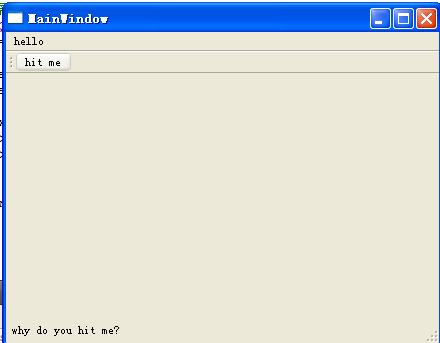
没触发工具栏或者触发1s过后显示如下:
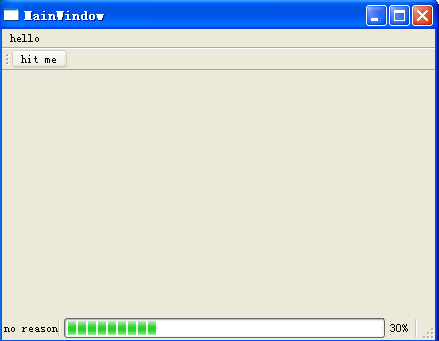
实验代码和注释如下:
#include "mainwindow.h" #include "ui_mainwindow.h" #include <QtGui> #include <QtCore> MainWindow::MainWindow(QWidget *parent) : QMainWindow(parent), ui(new Ui::MainWindow) { ui->setupUi(this); //注意构造此函数时需要加入父窗口指针这一参数。 my_label = new QLabel(this); my_progressbar = new QProgressBar(this); ui->statusBar->addWidget(my_label); ui->statusBar->addWidget(my_progressbar, 1); //如果是永久固定,则是不能覆盖的,不能更改了,不像上面的可以被覆盖 // ui->statusBar->addPermanentWidget(my_label); // //此处的参数1表示计算出的合适尺寸 // ui->statusBar->addPermanentWidget(my_progressbar, 1); my_label->setText("no reason"); my_progressbar->setTextVisible( true ); my_progressbar->setValue(30); } MainWindow::~MainWindow() { delete ui; } void MainWindow::on_actionHit_triggered() { //第二个参数为显示该内容持续的时间,以毫秒为单位。 ui->statusBar->showMessage("why do you hit me?", 1000); }
QMessageBox的使用:
QMessageBox在系统中常用的有下面几种风格,warning,question,information,其表现形式各有不同,仅从名字可以看出它给用户传递的消息本身就不同。
首先来简单的看看这几种消息box的特点。
标准的QMessageBox::information是一个OK按钮,当然这可以对它进行更改,可以加入其它扭。information的特点是有个!号。并且弹出该消息框后系统会发出响声
question的messagebox是带有个?号,弹出消息框后系统不发出响声。最后一个参数一定要用或,否则其返回结果是不能赋值给一个标准button replay的。
warning类型有个黄色的感叹号,也是发出一声警告声,没有information发出的的声音清脆,毕竟这是警告声。
本次实验就是写程序试一下其各种类型的效果。
效果如下所示:
主界面:
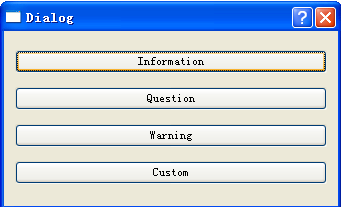
Information类型:
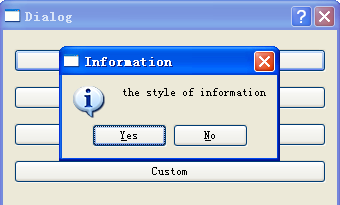
Question类型:
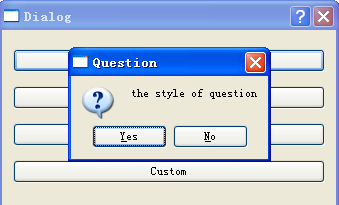
Warning类型:
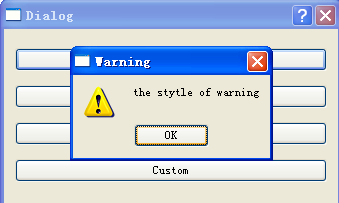
Custom类型:
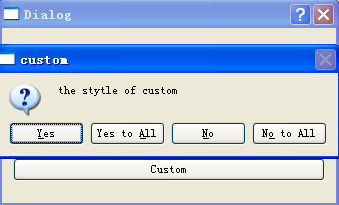
本次实验的代码及注释如下:
#include "dialog.h" #include "ui_dialog.h" #include <QtCore> #include <QtGui> Dialog::Dialog(QWidget *parent) : QDialog(parent), ui(new Ui::Dialog) { ui->setupUi(this); } Dialog::~Dialog() { delete ui; } void Dialog::on_infButton_clicked() { //标准的QMessageBox::information是一个OK按钮,当然这可以更改,加入其它按钮 //information的特点是有个!号。并且弹出该消息框后系统会发出响声 QMessageBox::information(this, "Information", "the style of information", QMessageBox::Yes, QMessageBox::No); } void Dialog::on_queButton_clicked() { QMessageBox::StandardButton replay; //question的messagebox是有个?号,弹出消息框后系统不好发出响声 //最后一个参数一定要用或,否则是不能赋值给一个标准button replay的 replay = QMessageBox::question(this, "Question", "the style of question", QMessageBox::Yes | QMessageBox::No); if( replay == QMessageBox::Yes) { QMessageBox::information(this, "question", "Yes"); } //如果直接用question类型的话,其对话框右上角是没有X号的,因为系统默认是要你选中的 // QMessageBox::question(this, "Question", "the style of question", // QMessageBox::Yes | QMessageBox::No); } void Dialog::on_warButton_clicked() { //有个黄色的感叹号 //也有一声警告声,没有information的声音清脆,因为这是警告声 QMessageBox::warning(this, "Warning", "the stytle of warning"); } void Dialog::on_cushButton_clicked() { //这里的消息类型可以自己随便定义 QMessageBox::question(this, "custom", "the stytle of custom", QMessageBox::Yes | QMessageBox::YesToAll | QMessageBox::No | QMessageBox::NoToAll); }
QTimer的使用:
QTimer主要是用来计算时间的,可以计算启动时间什么的。这里主要是初始化一下QTimer,并设定其定时时间,定时时间一到,则发出timeout()信号,而定时器又重新开始计时。其发射出的信号传到到槽函数后,可以在槽函数中来完成自己的功能。
运行效果如下:
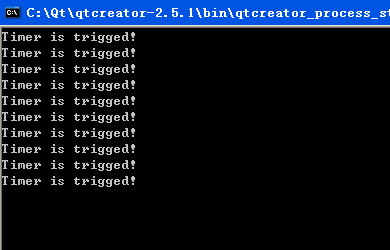
实验代码如下:
#include "mytime.h" #include <QtCore> #include <QDebug> MyTime::MyTime() { my_timer = new QTimer(this); //timeout这个信号表示的是timer设定的时间已经到达时发出的。 connect(my_timer, SIGNAL(timeout()), this, SLOT(my_time())); my_timer->start(2000); } void MyTime:: my_time() { qDebug () << "Timer is trigged!"; }
总结:好像没什么可总结的,见代码和注释。